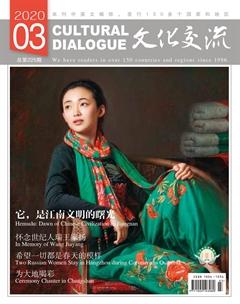怀念世纪人瑞王家扬
傅通先

2020年1月19日是個悲伤的日子。
德高望重的百岁人瑞王家扬走了!
与鲁迅有过密切交往的最后一位见证人走了!
关爱我退休后十年工作的慈祥的长者走了!
1918年生于浙江宁海一个贫苦农家的王家扬,11岁随长兄王育和到上海读书,与作家柔石一同居住在横浜路景云里23号。这本是鲁迅租住的房子。鲁迅搬离后仍旧住在不远处,所以王家扬常去鲁迅家串门,鲁迅和柔石都很喜欢这个聪明乖巧的少年,常给他讲江西红军反“围剿”斗争的消息,点燃少年心中的红色火苗。1931年1月17日,柔石在王家扬家里吃过中饭后出去开会,从此再也没有回来。原来是身为共产党员的柔石,在与一些进步青年作家开会时被国民党当局逮捕。柔石在狱中写了两封信给王家扬大哥,王育和当即把信转交给鲁迅看。仅仅过了20天,柔石与另四位青年作家就被秘密枪杀于上海龙华。
鲁迅先生听到噩耗,极其悲愤,写诗表达内心的愤慨:“忍看朋辈成新鬼,怒向刀丛觅小诗。”13岁的王家扬失去了朝夕相处的亲密老师,内心也十分沉痛。
鲁迅、王育和与一些浙江同乡为了帮助柔石三个遗孤,决定成立一个教育基金会。一日,王家扬听到敲门声,急忙开门,竟是鲁迅来了。他照例穿着长袍,亲切而慈祥地摸摸王家扬的头,然后拿出100块银元作为教育基金。
鲁迅先生逝世两年后,胸怀红色火苗的王家扬参加了新四军,翌年又加入了中国共产党。新中国成立后,历任全国总工会书记处书记、浙江省政协主席等职,直至1994年离休。
离休前后,王家扬同志做了三件名垂青史的好事。
第一,牵头创办了树人大学。
1984年,接到创办民办大学的倡议,王家扬即四处奔波,考察实地,八方纳贤,克难履艰,主持创办了这所全日制民办高校。他倡导“树人为兴国之本”,并拿出自己的积蓄设立了“王家扬奖学金”,厚德育人,播恩励学。如今,树人大学已经从最初的“三无”窘境中脱颖而出,发展为一所颇有名气的民办大学。
第二,参与创办了中国国际茶文化研究会。
王家扬本不嗜茶,自从调回浙江工作,在全国首屈一指的茶乡接触茶艺多了,深感茶作为一种世界性的健康饮料,尚缺少国际间的交流与合作。浙江是茶圣陆羽晚年的居住地,是他写作世界上首部茶学专著《茶经》的地方,最有资格和条件完成这一前所未有的使命。于是,在王家扬的倡议下,由杭州8家涉茶单位经过一年半的筹备,1990年10月,有中、日、韩、美等国和我国港、澳、台地区茶人参与的中国国际茶文化研讨会首次在杭州召开。王家扬主持会议,揭开了中国当代茶文化复兴的序幕。三年后,王家扬又倡议成立中国国际茶文化研究会,并得到国家民政部批准,王家扬众望所归,被推选为会长。他先后主持了浙江杭州、湖南常德、云南昆明、韩国汉城、浙江杭州、广东广州六届国际茶文化研讨会,又倡导树人大学设立我国首个茶文化专业。他以自己的执着和人格魅力让中国茶文化得到空前的发展和传播。2013年,王家扬被授予“世界杰出茶人贡献奖”。
第三,振兴了《文化交流》杂志。
1985年,浙江大学名誉校长、时任浙江省人大常委会副主任的刘丹创办了《文化交流》杂志,后因种种原因难以为继。1987年,王家扬同志觉得这样一本沟通海内外的杂志就此中断可惜,便接手过来,请浙江省对外文化交流协会、浙江省人民对外友好协会主办,并请刚从新闻岗位卸任的吴尧民任总编辑。王家扬同志亲自筹经费、搭班子、议选题,使这本中英文双语刊成了定期出版的双月刊。到了2000年,年事已高的吴尧民动员我接替他的工作,而我的直接领导便是刘枫、沈祖伦、王家扬三位。连续10年,每年的工作总结汇报会,三位领导都莅临会议,分别提出办刊意见和报道选题。
头三年,我尚处在报社返聘期,社会工作较多。一天王老把我召去,与我促膝谈心,并久久抓住我的手和颜悦色地说:“通先同志,多花一点精力办杂志!”我知道,这是在批评我投入《文化交流》的精力太少。但他的这种批评语气和方法让人暖心。
2005年10月,在《文化交流》杂志创刊20周年时,杂志获得了上级领导发来的贺信,刊登在第6期杂志的头条位置。王家扬同志很高兴,嘱咐我们要好好贯彻执行“充分发挥对外交流的窗口作用,把刊物越办越好”的指示。这年底,当我们报告想将杂志由双月刊改为月刊时,获得三位老领导的一致支持,并通过各种渠道增加了办刊经费。
2007年10月25日,我去王家扬同志住宅汇报工作时,听他回忆当年与鲁迅、柔石相处的情景,并据此整理出《王家扬忆鲁迅、柔石》一文。老人仔细审阅,亲笔改动了20多处。文章在《文化交流》杂志发表后,几家报刊转载,引起读者的广泛关注。
2020年年初,我在新书《天堂探花》出版后特地选取一册写上“敬呈王家扬同志教正”,可是在投递途中惊闻老人逝世的噩耗,再也无法聆听这位慈祥领导的教诲了!1月22日,我的手机上收到王家扬子女的《答谢辞》。其中有一段非常感人的话:“遵父亲‘后事从简,不打扰人,不留骨灰,撒到茶园的遗嘱,我们已经送父亲去了他想要去的地方”。
一个高尚的灵魂将永运伴随他钟爱的茶香而流芳千古。
Wang Jiayang passed away on January 19, 2020 at 102. I worked as editor-in-chief of Cultural Dialogue under his guidance for ten years after I stepped down from the leadership of Zhejiang Daily Press Group.
Born into a poor rural family in Ninghai in 1918, Wang Jiayang arrived in Shanghai and went to school there when he was 11 years old. His elder brother Wang Yuhe, 15 years senior, took care of him. They lived in a house in Jinyun Lane. Lu Xun had used to live in the same house before he moved somewhere not far from the lane. As his big brother was a friend of Rou Shi (1902-1931), an author who was a friend of Lu Xun, Wang Jiayang knew Lu Xun personally. On January 17, 1931, Rou Shi had lunch at Wangs home and then left. But he never came back. A member of the Communist Party of China, Rou Shi was arrested with some young writers. Rou Shi wrote Wang Yuhe two letters from jail. The letters were actually meant for Lu Xun. The elder brother delivered them to Lu. Rou and four other young writers were secretly executed 20 days later. After Rou died, Lu Xun, Wang Yuhe, and some natives of Zhejiang set up an education fund for the three children of Rou Shi. One day, Lu Xun came to visit Wang Yuhe. Wang Jiayang opened the door to the visitor. As his elder brother was not home, Lu Xun didnt stay. He left 100 silver dollars and asked him to pass them on to his elder brother.
In the first three years of the decade I worked as editor-in-chief, I was also engaged in some work at Zhejiang Daily Press Group. One day, Wang Jiayang asked me to visit him. We had a conversation. He held my hand for a long time and asked me to focus on Cultural Dialogue. I immediately realized that he was criticizing me for not spending adequate time on running Cultural Dialogue. I was deeply touched by his gentle approach.
October 2005 saw the 20th anniversary of Cultural Dialogue, which was still a bimonthly then. We received a letter of congratulation from the chief of the CPC committee of the province. The letter was reprinted in the sixth issue of the year. Wang was very happy and urged us to “give full play to the window on international exchanges and keep improving the publication”, as instructed in the letter of congratulation. At the year end of 2005, we proposed to upgrade the bimonthly to monthly. Liu Feng, Shen Zulun and Wang Jiayang supported the proposal. They helped make financial arrangements so that the monthly had adequate funds.
On October 25, 2007, I visited Wang and reported my work at Cultural Dialogue. After the report, Wang reminisced about Lu Xun and Rou Shi he met when he was very young. I jotted down the details and later fleshed them out in a report. Wang proofread the manuscript and made 20 plus corrections. It was printed in the January 2008 issue of Cultural Dialogue and caused a stir among readers. It was reprinted in other publications.
In early 2020, I was about to send out a copy of my new book to Wang when I learned that he had just passed away. How grieved I was! On January 22, I received a text from the children of Wang Jiayang. They followed their fathers will that partly reads “Simplify funeral arrangements. Disturb nobody. Dont keep bone ashes and scatter them in a tea plantation.”

